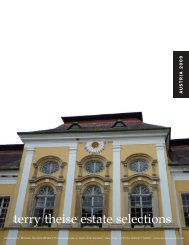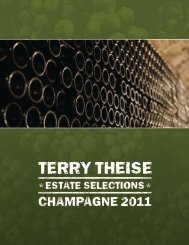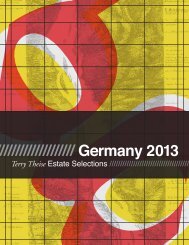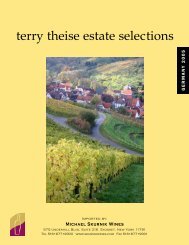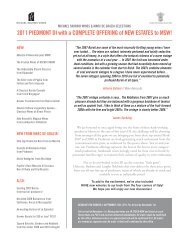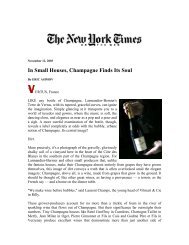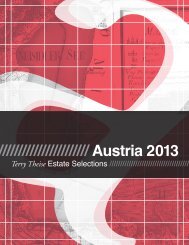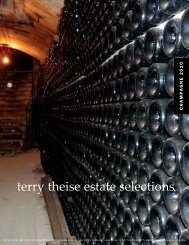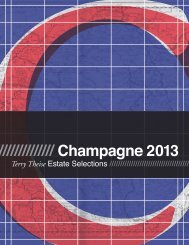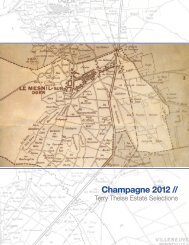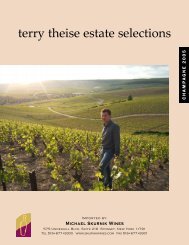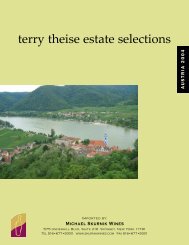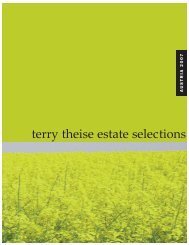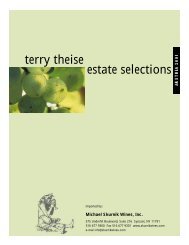German Catalog 2006 USE THIS ONE.qxp - Michael Skurnik Wines
German Catalog 2006 USE THIS ONE.qxp - Michael Skurnik Wines
German Catalog 2006 USE THIS ONE.qxp - Michael Skurnik Wines
You also want an ePaper? Increase the reach of your titles
YUMPU automatically turns print PDFs into web optimized ePapers that Google loves.
MOSEL WINES<br />
74<br />
reuscher-haart<br />
mosel • piesport<br />
Something seems to be up at Reuscher Haart. Maybe it’s the influence of Bernd and Mario Schwang,<br />
Dad Hugo’s two sons (who look like members of Limp Bizkit) or maybe it’s just one of those things.<br />
In any case, the past two vintages reminded me of the majestic 1990s and brilliant 1993s. Even the<br />
2003s, about which I was dubious at first, have firmed up wonderfully with bottling, and I now<br />
feel my first impressions were misleading. Then along came the stunning 2004, and this estate is<br />
really showing me something yet they haven’t abandoned their fundamental style, Mosel wine<br />
in the form of a heavy suede jacket; if anything they’ve renewed it in even stronger form.<br />
These are Piesporters as Justen might make them; corpulent, leesy and old-fashioned. I really<br />
shouldn’t do the cask-tasting thing here at all. The sulfury aromas of some young Mosels are often<br />
stubbornly present. Eventually you get a kind of x-ray<br />
vision with cask samples, but these winesaren’t really<br />
made for our frantic world. SHOW WELL! KICK ASS!<br />
SELL THROUGH! WHAT’S NEXT? Not like that. Maybe<br />
ours are the last generations who’ll live in microwavetime.<br />
It really isn’t conducive to savoring the wine experience,<br />
that mentality. Do you suppose there’s an incipient<br />
movement toward a more attentive mode of living?<br />
Not ouiji-board goopy, but just pausing long enough to<br />
notice stuff? I hope so, or wine as we know it is doomed.<br />
Life as we know it is doomed.<br />
I have a stormy relationship with Piesporters. When<br />
I first encountered Reuscher-Haart’s wines, I thought I<br />
had found my Piesport pie-in-the-sky. In their aciddrenched,<br />
thick, leesy style I found for the first time stunningly<br />
detailed and authoritative wines from these maddening<br />
slopes that didn’t need to be archly modern in<br />
order to succeed.<br />
Hugo & Mario Schwang<br />
Talking with Hugo Schwang confirmed certain<br />
thoughts I had formed about his wines. “We use no cultured<br />
yeasts,” he said. “If your harvest is clean and you<br />
let your must clarify by settling, the natural yeasts will<br />
give you a wine with more character.” This made sense;<br />
Schwang’s wines lacked the finicky refinement cultured-<br />
•Vineyard area: 4.5 hectares<br />
•Annual production: 2,800 cases<br />
•Top sites: Piesporter Goldtröpchen,<br />
Domherr, Falkenberg, and Treppchen<br />
•Soil types: Slate<br />
•Grape varieties: 93% Riesling,<br />
5% Müller-Thurgau, 2% Regent<br />
yeast wines can display. He leaves his wine on its primary<br />
lees for a remarkable length of time: two to three<br />
months is common, though less-ripe wines will be<br />
racked earlier. Bottling is rarely earlier then May or June.<br />
“I’d personally say that these are the most important factors<br />
for high quality,” he says. “First, your vineyard, its<br />
soil and its exposure. Second, your yields, i.e. your pruning.<br />
Third, the timing of your harvest. Fourth, the selectivity<br />
during harvesting. Fifth, gentle and natural handling<br />
of the wine. We don’t use any sorbic acid and we<br />
never blue-fine. I want my personal enthusiasm as a<br />
winemaker to be mirrored in the wines I make.”<br />
Last year the talk was all about organic. In essence,<br />
said Schwang, the estate is nearly all the way there, so<br />
why not take that small final step? What did we think? I<br />
sad we applauded organic viticulture as a matter of<br />
principle, but we could offer no commercial incentive. “I<br />
hope you’ll do it,” I said, “because it’s worth doing. But<br />
that doesn’t mean I’ll think less of you or your wines if<br />
you don’t.”<br />
In fact the Mosel is among the most difficult regions<br />
to work strictly organically, yet the so-called lutte raisonné<br />
of France, known as “integrated” agriculture in<br />
<strong>German</strong>y, has taken a firm hold. In essence this stops<br />
short of certifiably organic but encourages organic as a<br />
preference as much and as often as possible.



